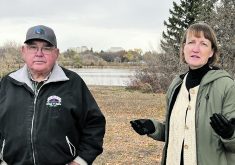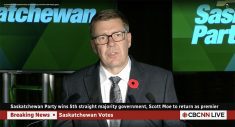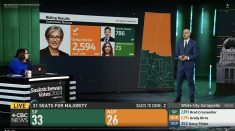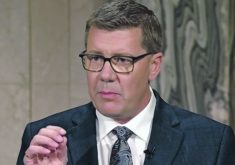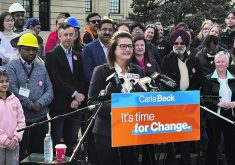Sask. Party and NDP will take majority of seats, but other parties will be on the ballot after nominations close Oct. 12
REGINA — The Saskatchewan United Party didn’t even exist when the province last went to the polls in 2020.
But its leader, Jon Hromek, finished second in the 2023 Lumsden-Morse byelection, and the party is running at least 28 candidates in the 61 constituencies. They include three former Sask. Party MLAs: Nadine Wilson in Saskatchewan Rivers, former Arm River MLA Greg Brkich in Saskatoon Southeast and the man who once held premier Scott Moe’s riding, Denis Allchurch, running in Meadow Lake.
The official campaign for the Oct. 28 vote began Oct. 1, although the NDP has been announcing its plans for weeks. Both major parties are running on affordability, with Moe promising significant income tax cuts.
Read Also

New program aims to support plant-based exports to Asia
Understanding the preferences of consumers in Taiwan and how they differ from Indonesia or Malaysia isn’t easy for a small company in Saskatchewan.
The SUP released a full platform Oct. 3, promising to reduce the provincial sales tax from six per cent to three, eliminate the 15-cent-per-litre gas tax and cut property taxes on seniors’ primary residences by 65 per cent.
“The Sask. United Party is dedicated to bringing good common sense government to the people of Saskatchewan,” Hromek said.
“The Sask. Party has governed for 17 years, nearly an entire generation, but this is no longer the Sask. Party of Brad Wall.”
Hromek said his party offers a “true conservative option.”
The only policy specific to agriculture is to invest in processing facilities and infrastructure to create more value-added opportunities for farmers.
It would transform the health care system by integrating privately owned facilities into the publicly funded system.
It will recognize parents’ role in education, remove ideology from the curriculum, ensure freedom of expression on post-secondary institution campuses and implement standardized testing.
It promises to eliminate net-zero policies and use coal and natural gas until they are depleted.
“The current governments (sic) investments in wind and solar projects have proven to be inefficient failures consuming billions of taxpayer’s dollars with limited returns,” the document said.
“We will end costly and economically destructive green energy projects proposed by Scott Moe’s Net-Zero by 2050 agenda.”
Hromek said a SUP government would re-open the royalty framework for potash to get a fair deal for citizens and cover the cost of the promised tax cuts.
Other policies include a war on crime, enhanced provincial power and responsible immigration, as well as treating everyone equally and protecting gendered spaces.
“We will ban biological males from women’s only spaces, including changing rooms and bathrooms, so that young girls and women feel comfortable. Additionally, we will ensure that biological males do not participate in female sports in order to maintain fairness and to protect the integrity of women’s competitions,” the platform said.
Realistically, Hromek said he is hoping to win at least two seats.
Meanwhile, the Buffalo Party of Saskatchewan, considered the right-wing threat four years ago, has not gained much traction since then. Plans for a coalition with the Progressive Conservative Party of Saskatchewan fell apart in September.
The party’s agriculture policy calls for a small farms initiative, capital gains tax exemptions on sales of farmland to residents or returning residents, the end of exemptions for foreign land ownership and regulations on “mega-farmland ownership” of more than 100,000 acres.
It wants fewer regulatory barriers on the farm-to-fork process and hemp production, and the removal of mandatory French labelling requirements.
The PC party also advocates for more control over farmland and a revamped Farmland Security Board. It wants the board manager to be more proactive when investigating proposed land sales and require all corporations that buy land to reveal shareholder names.
The Green Party would establish a Local Food Security Act, help younger farmers access land and support sustainable agriculture, among other things.
The deadline for candidate nominations is Oct. 12.
In 2020, the Buffalo Party earned 2.54 per cent of the votes, the Greens 2.25 per cent, the PC party 1.89 per cent, the Liberals, now known as the Saskatchewan Progress Party, 0.08 per cent, and independents 0.24 per cent.
The Sask. Party won 48 seats with 61 per cent and the NDP 13 seats with 32 per cent.
At dissolution, the seat distribution was 42 Sask. Party, 14 NDP, one SUP, three independent and one vacancy.






